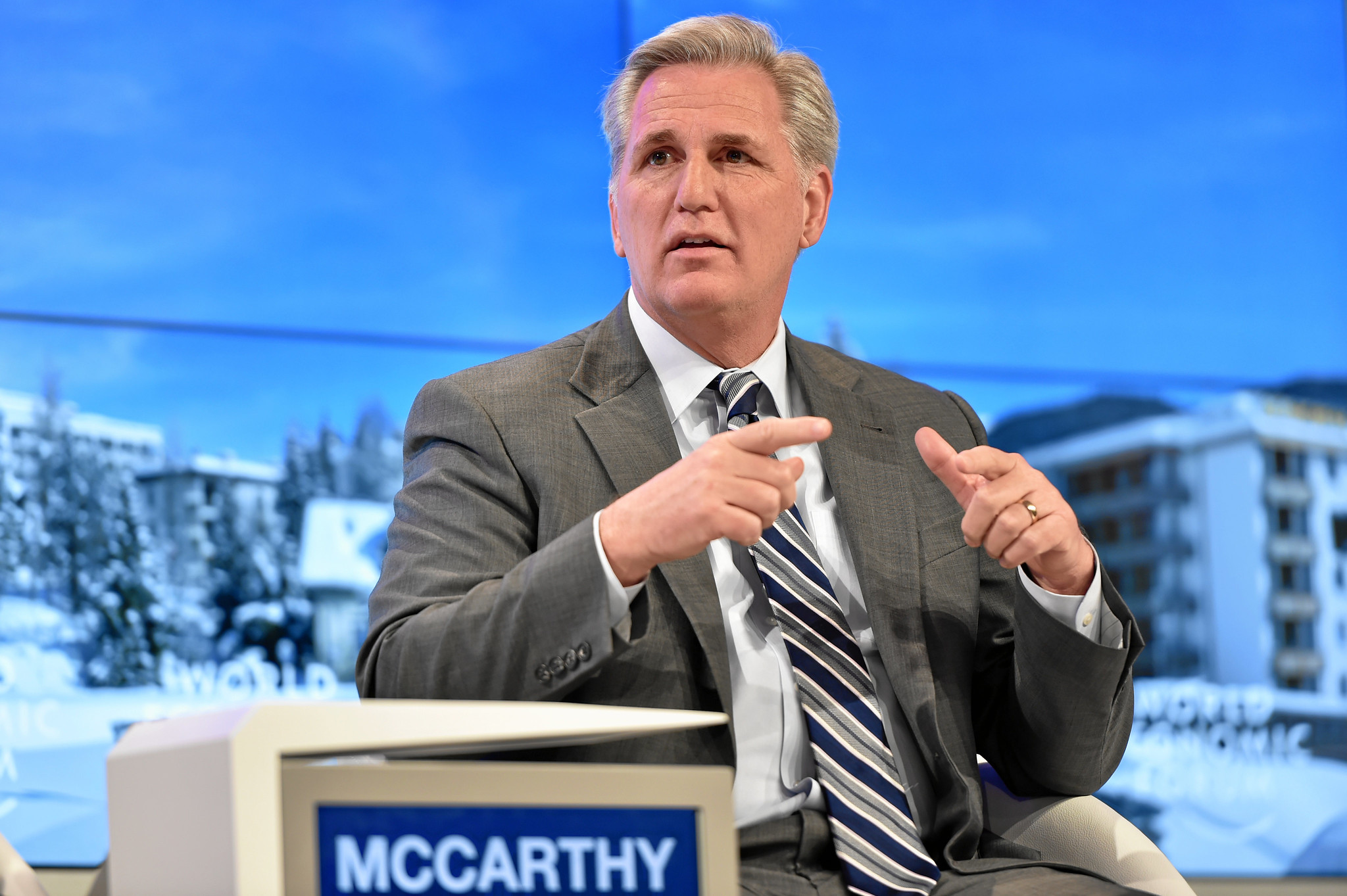What to Make of the Subpoenas to House Republicans?
After months of attempting to persuade the members to appear voluntarily, the January 6 select committee has subpoenaed five Republican House members to testify.

Published by The Lawfare Institute
in Cooperation With

After months of attempting to persuade the members to appear voluntarily, the January 6 select committee has subpoenaed five Republican House members to testify. The committee announced on Thursday that it has issued deposition subpoenas to Kevin McCarthy, Scott Perry, Jim Jordan, Andy Biggs and Mo Brooks. It explained on Twitter that these members “include those who participated in meetings at the White House, those who had direct conversations with President Trump leading up to and during the attack, and those who were involved in the planning and coordination of certain activities on and before January 6th.”
The question of whether or not the committee can issue such subpoenas is straightforward. There is little doubt the House has at least as much authority to subpoena its own members as to subpoena executive officials or private citizens. Ordinarily, members under investigation by the ethics committee, for example, will comply with the committee’s requests for information precisely because they understand the committee has the power to use subpoenas to compel production if necessary. And on rare occasions, the ethics committee will issue subpoenas to an uncooperative member; this happened, for example, during the investigation of former Representative Charles Rangel. In another case, the committee issued document subpoenas to staff members and the custodian of records of a member’s congressional office in order to obviate Fifth Amendment issues that might arise from requiring the member to produce those records himself.
So what happens next? There is every indication the members do not intend to comply with the subpoenas, but they presumably will not ignore them entirely. Most likely, they will file objections with the committee (as is normal practice when witnesses seek to resist congressional subpoenas). They also could sue the committee in federal court to restrain the enforcement of the subpoenas (as many other witnesses subpoenaed by the Jan. 6 Committee have done), but for reasons discussed below it may not be in their best interests to take this route.
The committee has several enforcement options, but each of them has serious drawbacks. One option is for the committee itself to sue for enforcement of the subpoenas. There are, however, at least three reasons why this is unlikely. First, civil litigation takes too long,as House committees have ruefully discovered during the Trump and prior administrations, and therefore is unlikely to produce any information in time to be useful to the January 6 committee; this is presumably why the committee has not sued other recalcitrant witnesses.
Second, while it is not entirely unheard of for a congressional committee to bring suit against a colleague—in the 1990s the Senate ethics committee sued Senator Packwood to get access to his diary in its sexual harassment investigation—the House may (and should) be reluctant for institutional reasons to ask the courts to resolve its internal disputes. As Professor Josh Chafetz has observed, running to the courts for enforcement assistance is in some sense an admission of weakness; this observation is even more apt in the context of a dispute with the House’s own members than of one with outside witnesses.
Finally, the courts themselves may be less than eager to hear such cases, and there is a risk that courts could throw out such a suit without reaching the merits. For example, consider a situation where the Republican defendants argue that federal courts lack jurisdiction over this dispute under the Speech or Debate Clause, which prohibits members from being questioned “in any other Place,” other than in Congress, about legislative activities. While the Clause does not restrict the committee’s authority to subpoena members to testify in Congress, it arguably limits the authority of courts to enforce those subpoenas. D.C. Circuit precedent suggests that the applicability of the Clause will depend on whether the subject of the subpoenas is viewed as falling within the legislative sphere. Some of the activity about which the Jan. 6 committee wishes to inquire (such as discussions about how to vote on objections to presidential electors) may fall within the legislative sphere, while matters like Congressman Perry’s alleged efforts to install Jeffrey Clark as the acting attorney general probably do not. In sum, a lawsuit to enforce these subpoenas would be complicated.
Another option for the select committee would be to refer the recalcitrant witnesses to the U.S. attorney for potential criminal prosecution. The committee has been cautious about using this option so far; it has referred only four witnesses for criminal contempt and then only after efforts to reach accommodation with their counsel failed. Criminal referrals require a vote of the entire House, and one can anticipate that some members will be reluctant to set a precedent of referring their colleagues to a grand jury. Furthermore, the Justice Department, which to date has moved forward only with the easiest of the four prior referrals (Steve Bannon), will likely be cool to these additional referrals, which would be politically charged and legally complex—primarily due to the aforementioned Speech or Debate issues. All in all, criminal referral is probably not an attractive option for the January 6 committee here.
Other witnesses have attempted to forestall criminal contempt referrals by bringing preemptive civil actions against the select committee. McCarthy et al. may be tempted to do this as well, but there are some risks for them in taking this approach. For one thing, they would almost certainly lose on jurisdiction. The select committee itself is protected from suit by the Speech or Debate Clause and, unlike in some of the prior cases, there is no third party defendant to provide a jurisdictional basis for the court to reach the merits. And their chances would not improve much if the court did reach the merits, given that prior cases have repeatedly rejected their primary merits arguments—namely that the committee is invalidly constituted and lacks a legitimate legislative purpose. Finally, bringing suit could undermine a future Speech or Debate defense by demonstrating they believe the dispute is appropriate for judicial resolution.
In short, both the committee and the subpoena recipients have incentives to avoid going to court if they can. The committee could instead consider internal House enforcement options. One option, referring the matter to the House Ethics Committee for investigation, seems unattractive because that committee is evenly divided along partisan lines and is unlikely to take any action on such a politically divisive issue. Furthermore, even if the ethics committee commenced an investigation, it is difficult to see how that would benefit the Jan. 6 inquiry, particularly given that the ethics proceedings are confidential.
That leaves one last option, which would be to hold public hearings before the committee and/or the House as a whole on the failure of the subpoena recipients to comply. The purpose of the hearing before the committee would be to rule on any objections filed and to consider recommendations to the House for further action. The House proceeding could consist of a debate on a resolution of censure or reprimand or even a trial before the bar of the House as an exercise of the inherent contempt power. Given that the House has been recently willing to impose fines for violations of things like mask mandates, it is conceivable (though probably unlikely) that the House would impose fines on the contemnors for each day that they refused to comply with the subpoenas. In theory, though certainly not as a practical matter, the House could even order the contemnors arrested by the Sergeant at Arms until they agree to comply with the subpoenas.
Absent the political will to impose a punishment with teeth, this option only makes sense if the select committee believes that it has such strong evidence as to why it needs the testimony of these members that it can sway public opinion or even some of their Republican colleagues. But if that is true, it is unclear why it could not make the same case in its regular public hearings, which are supposed to begin in June. For the court of public opinion, the fact that the Republican members have refused to cooperate voluntarily with the January 6 investigation is more or less the same as their refusal to comply with subpoenas. In either case, the inference can be drawn that whatever information these witnesses have would not be flattering to President Trump or his efforts to overturn the election.
In short, it is somewhat puzzling that the January 6 committee has chosen to subpoena these members at such a late date in its investigation. How this action fits within the committee’s strategy is not obvious, but perhaps that just shows the committee knows things that I do not.




